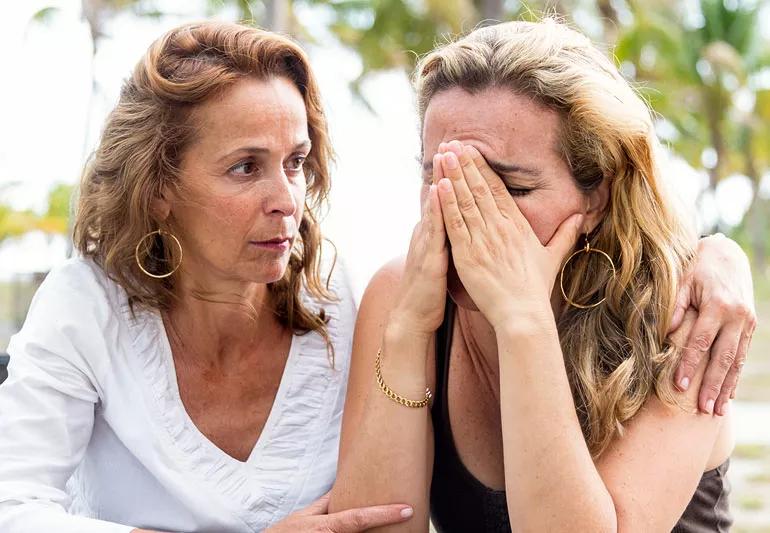The cancer journey doesn’t end after treatment

Image content: This image is available to view online.
View image online (https://assets.clevelandclinic.org/transform/2b276b2d-0a3f-4da0-b702-322fb85a8359/cancerSupport-586357580-770x533_jpg)
Woman supporting her friend
If your friend, colleague, partner or family member has completed cancer treatment, you probably feel relieved that their treatment is over and was successful. And you probably imagine they’re feeling relieved, too.
Advertisement
Cleveland Clinic is a non-profit academic medical center. Advertising on our site helps support our mission. We do not endorse non-Cleveland Clinic products or services. Policy
But cancer is an emotional roller coaster – and it doesn’t come to a screeching halt once treatment ends. In fact, this can be one of the most challenging times for those with cancer, says psychologist Kathleen Ashton, PhD, who specializes in breast cancer survivorship.
Many cancer survivors feel different than they did before cancer and must adjust to a “new normal” where they aren’t visiting the doctor’s office or hospital each day. They may feel frequent anxiety about what’s next, and whether the cancer will return. Plus, they may continue to experience physical side effects from treatment, or from new medications they’re taking to lessen the risk of recurrence.
So while you may hope and expect for things to go back to “normal” after your loved one receives the all-clear, it’s important to understand the complex feelings they might be experiencing.
Here are some ways you can show support.
Many people develop fatigue, pain, insomnia, or difficulties concentrating or remembering during cancer treatment. Your loved one might also experience emotional symptoms like a depressed mood or irritability. It’s important for them to pace themselves and only plan a reasonable amount of daily activity based on where they are in recovery, Dr. Ashton suggests.
Advertisement
Be patient with them and meet them where they are in their journey. It’s great to plan pleasurable visits and outings that will boost their mood, but understand that they’ll need to rest, too.
“Up to 70% of patients may have this strong fear that the cancer is going to return,” Dr. Ashton says.
While this might be a scary topic to talk about with your friend or loved one, it might be helpful for them to think or talk through how they would cope with it. Working with a psychologist may also help them address these fears. “Many times that fear is something that needs to be faced,” Dr. Ashton says.
While you certainly want to make your loved one feel better, sometimes people just need to feel heard. Lend an ear to your friend, and let them know you want to hear about how they’re doing.
“One of the best things you can do is not just ask people what you can do, but instead just show up and do it,” Dr. Ashton explains.
Your friend may be so overwhelmed at any given moment that she can’t think of what she needs help with, and coming up with something becomes almost a burden to her. So offer to cook your friend a meal, or let her know you’ll pick up her kid from soccer practice.
Those who have cancer and survivors are at a higher risk for suicide, and some people actually develop post-traumatic stress disorder after treatment. Seek help if you notice that your loved one is struggling to function on a daily basis, withdraws socially or can’t find pleasure in things that used to make them happy.
Body image and sexual health are two of the biggest issues for survivors, Dr. Ashton says. Especially if someone has had surgery or lost their hair, they may struggle to accept their new appearance.
Some medications can also cause sexual side effects.
“Oftentimes there’s some work to do there in terms of building a romantic relationship back up and finding ways to deal with those side effects,” she says.
Allow your loved one space to grieve for these things, and try not to underestimate the gravity of them.
Remember that friends and family play an important role on a person’s cancer care team. Your compassion and small favors can go a long way in making sure they feel supported in this next phase.
Advertisement

Sign up for our Health Essentials emails for expert guidance on nutrition, fitness, sleep, skin care and more.
Learn more about our editorial process.
Advertisement
Cancer is deadlier in racial and ethnic minority groups and for people in low-income areas
Thoughts and feelings can change over time; relaxation, self-care and support groups can help
Here's how you can tell if you're ready
One quarter of patients develop a brain tumor later
From a thoughtful note to a special pillow, these items are a win
Testing your well water system annually can help prevent contaminants and bacterial overgrowth
Rely on trusted information from hospital systems, medical nonprofits or your oncologist
Misconceptions can be worse than reality
Type 2 diabetes isn’t inevitable with these dietary changes
Applying a hot or cold compress can help with pain
Pump up your iron intake with foods like tuna, tofu and turkey